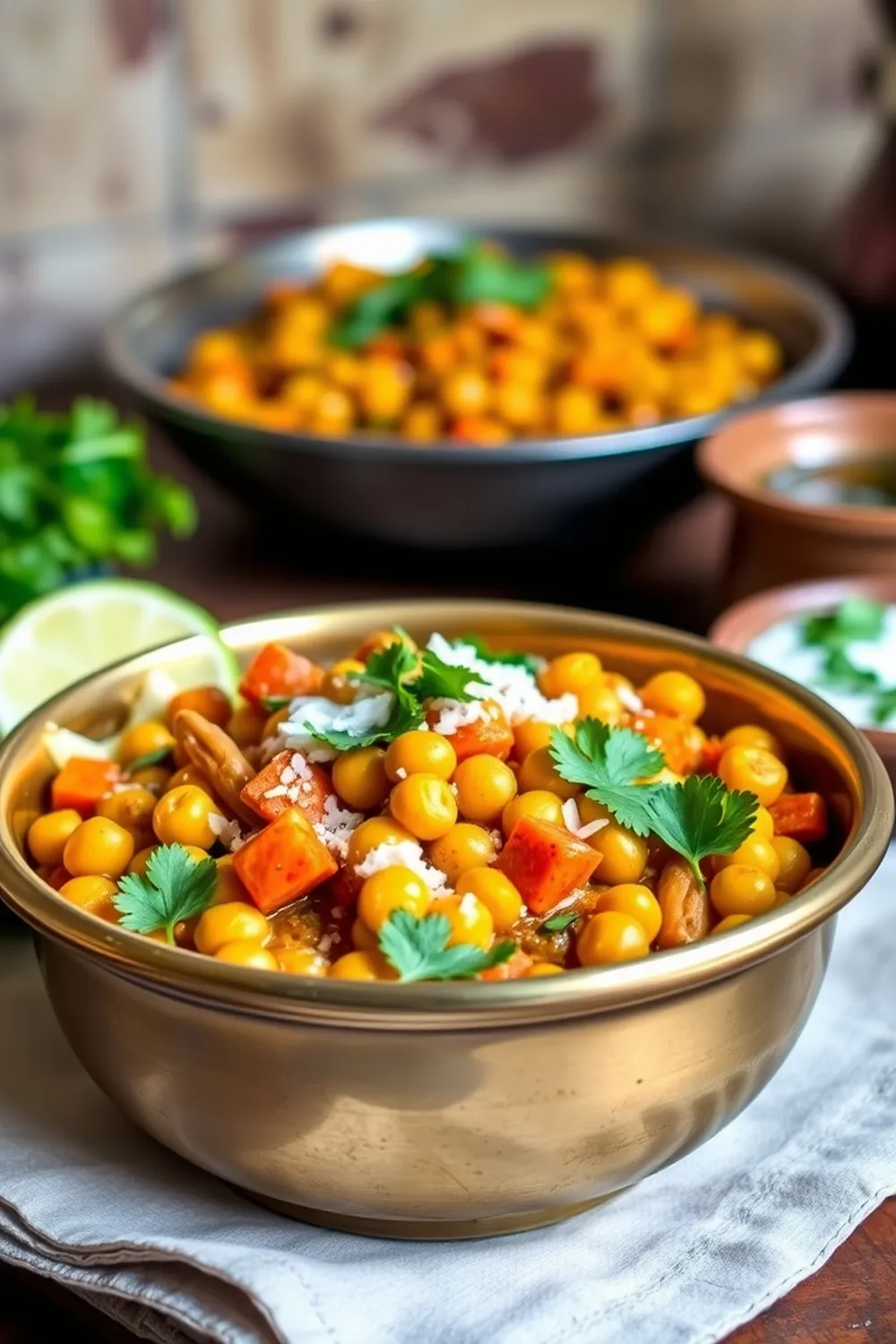- Peel the boiled eggs and make 3-4 slits in them. Prepare tomato-cashew puree (optional) by blending tomatoes and cashews.
- Heat oil in a pan. Add cumin seeds, mustard seeds, and curry leaves. Let them splutter.
- Add chopped onions and green chilies. Sauté until golden brown.
- Stir in ginger-garlic paste and cook until the raw aroma disappears.
- Add tomato-cashew puree or chopped tomatoes. Cook until the mixture thickens.
- Mix in turmeric powder, red chili powder, garam masala, coriander powder, and salt. Sauté for 2 minutes.
- Gently add the slit eggs to the masala. Sauté for 2 minutes to coat them.
- Pour water to adjust gravy consistency. Bring to a boil, then simmer until the curry thickens.
- Optional: Stir in coconut milk for creaminess. Garnish with coriander leaves.
- Serve hot with rice, chapati, or dosa.
- Calories:343 kcal25%
- Energy:1435 kJ22%
- Protein:15 g28%
- Carbohydrates:14 mg40%
- Sugar:7 mg8%
- Salt:815 g25%
- Fat:25 g20%
Last Updated on 4 months by Neha Deshmukh
Egg Curry Recipe- Authentic Indian Egg Masala with Cashews
Introduction
There’s just something so comforting about a warm bowl of egg curry, isn’t there? It’s a dish that instantly reminds me of my grandmother’s kitchen – the aroma of spices filling the air, and the promise of a delicious, satisfying meal. This Egg Curry recipe is my take on that classic, a blend of traditional flavors with a few little tweaks to make it extra special. It’s surprisingly easy to make, even on a busy weeknight, and it’s guaranteed to become a family favorite.
Why You’ll Love This Recipe
This isn’t just any egg curry. It’s a flavour bomb! The combination of aromatic spices, a rich gravy, and perfectly cooked eggs is simply irresistible. Plus, the optional cashew paste adds a beautiful creaminess and depth of flavour that takes it to another level. It’s a complete meal in itself, perfect with rice, roti, or even a crispy dosa.
Ingredients
Here’s what you’ll need to create this delicious Egg Curry:
- 4 hard boiled eggs
- 2 tablespoons oil
- ½ teaspoon mustard seeds
- ½ – ¾ teaspoon cumin seeds
- 1-2 sprigs curry leaves
- 1 cup chopped onions
- 1 green chili, finely chopped (adjust to your spice preference!)
- 1 teaspoon ginger-garlic paste
- 2 medium tomatoes, chopped
- 8-10 whole cashews
- ½ teaspoon turmeric powder
- ½ – 1 teaspoon red chili powder
- ¾ – 1 teaspoon garam masala powder
- 1 teaspoon coriander powder
- ½ – ¾ teaspoon sea salt (or to taste)
- ¾ – 1 cup water
- 3 tablespoons chopped coriander leaves, for garnish
- ¼ – ½ cup thick coconut milk (optional)
Ingredient Notes
Let’s talk ingredients! A few little things can make a big difference:
- Cashews: Don’t skimp on the cashews if you’re making the puree. They add a lovely richness.
- Tomatoes: Ripe, juicy tomatoes are best. If you’re using canned, opt for whole peeled tomatoes and crush them yourself.
- Spices: Freshly ground spices always have the most flavour, but good quality pre-ground spices work well too.
- Eggs: Use good quality eggs. I prefer free-range for a richer yolk.
- Coconut Milk: Full-fat coconut milk gives the best flavour and creaminess.
Cashews & Tomato Puree – A South Indian Influence
The cashew and tomato puree is a nod to South Indian cooking. My mother always added cashews to her curries, and it really elevates the flavour. If you’re short on time, you can skip it and just use chopped tomatoes, but trust me, it’s worth the extra effort!
Spice Blend – Balancing Heat & Aroma
The spice blend is the heart of any Indian curry. We’re aiming for a balance of warmth, aroma, and a little bit of heat. Feel free to adjust the red chili powder to your liking.
Coconut Milk – Regional Variations & Creaminess
Coconut milk isn’t traditionally used in every egg curry, but it’s a popular addition, especially in coastal regions. It adds a beautiful creaminess and mellows out the spices. It’s totally optional, though!
Eggs – Choosing the Right Eggs for Curry
For egg curry, I like to use eggs that are a little older (a week or so). They peel more easily! Hard-boiling them perfectly is key – about 8-10 minutes in boiling water should do the trick.
Step-By-Step Instructions
Alright, let’s get cooking!
- Peel the boiled eggs and make 3-4 slits on each one. This helps them absorb all that delicious flavour.
- If you’re making the cashew puree, blend the tomatoes and cashews with a little water until smooth. Set aside.
- Heat the oil in a pan over medium heat. Add the mustard seeds and cumin seeds. Let them splutter – this releases their flavour.
- Add the curry leaves and sauté for a few seconds until fragrant.
- Add the chopped onions and green chilies. Sauté until the onions are golden brown.
- Stir in the ginger-garlic paste and cook until the raw aroma disappears.
- Add the tomato-cashew puree (or chopped tomatoes). Cook until the mixture thickens and the oil starts to separate.
- Mix in the turmeric powder, red chili powder, garam masala powder, coriander powder, and salt. Sauté for 2 minutes, stirring constantly to prevent burning.
- Gently add the slit eggs to the masala. Sauté for 2 minutes to coat them evenly.
- Pour in the water to adjust the gravy consistency. Bring to a boil, then simmer until the curry thickens to your liking.
- If using, stir in the coconut milk during the last 5 minutes of cooking.
- Garnish with fresh coriander leaves and serve hot!
Expert Tips
Here are a few tips to help you make the perfect Egg Curry:
Achieving the Perfect Gravy Consistency
The gravy should be thick enough to coat the eggs, but not too thick that it’s pasty. Start with ¾ cup of water and add more as needed.
Blooming the Spices for Maximum Flavor
Letting the mustard and cumin seeds splutter in hot oil is crucial. It “blooms” the spices, releasing their essential oils and maximizing their flavour.
Preventing Eggs from Disintegrating
Be gentle when adding and stirring the eggs. They can be delicate, especially after being boiled.
Using Fresh vs. Ground Spices
Freshly ground spices are always best, but good quality pre-ground spices work well in a pinch.
Variations
- Vegan Egg Curry (Using Alternatives): Substitute the eggs with boiled potatoes or chickpeas for a delicious vegan version.
- Gluten-Free Egg Curry: This recipe is naturally gluten-free!
- Spice Level Adjustment – Mild, Medium, Hot: Adjust the amount of red chili powder to control the heat. Start with ½ teaspoon for mild, 1 teaspoon for medium, and 1 ½ teaspoons or more for hot.
- Festival Adaptations – Navratri & Special Occasions: This curry is a great addition to a Navratri thali, or any special occasion.
Serving Suggestions
This Egg Curry is incredibly versatile. Serve it with:
- Steaming hot rice
- Warm chapati or roti
- Crispy dosa
- A side of raita (yogurt dip)
- A simple salad
Storage Instructions
Leftover Egg Curry can be stored in an airtight container in the refrigerator for up to 3 days. It actually tastes even better the next day as the flavours meld together!
FAQs
What type of oil is best for making Egg Curry?
Mustard oil is traditional, especially in Eastern India, and adds a lovely pungent flavour. However, vegetable oil, sunflower oil, or coconut oil all work well too.
Can I make this Egg Curry ahead of time?
Yes! You can make the curry base (up to step 9) ahead of time and store it in the refrigerator. Add the eggs just before serving.
How can I adjust the tanginess of the curry?
Add a squeeze of lemon juice or a pinch of tamarind paste to increase the tanginess.
What is the best way to peel hard-boiled eggs without damaging them?
Run the eggs under cold water and gently tap them all over to create cracks. Then, start peeling from the larger end.
Can I use store-bought tomato puree instead of making my own?
Absolutely! Just make sure to choose a good quality puree with no added sugar or salt.










